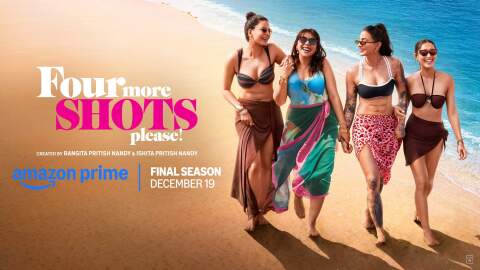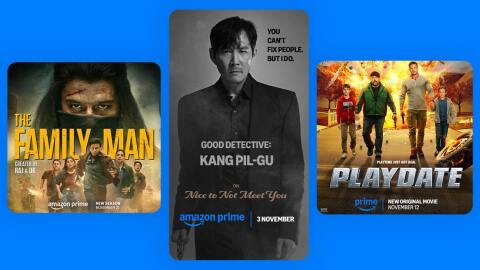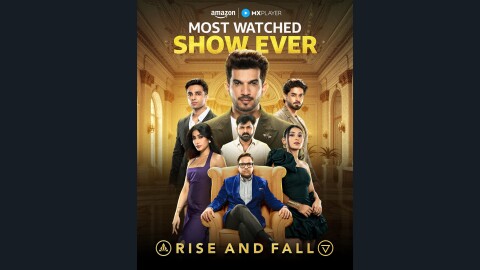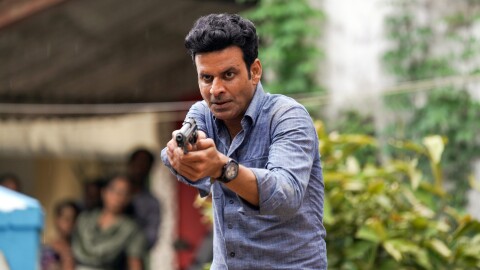
The second season of Four More Shots Please (FMSP) is out. How tense/relaxed were you before the release of this series?
I have to admit I was quite excited yet anxious at the same time. I don’t think I slept for at least three nights before the release! While the characters remain the same we had gone in deeper into their emotional journeys and their challenges; I had worked hard to bring in my own directorial voice, vision and tone to the show and I was hoping for all of this to be accepted by the existing audiences and to draw new audiences in.
How does this compare to a movie release as you’ve walked on that road as well? We ask because unlike a movie in OTT every episode matters, every season counts?
A movie release is a slightly different ball game since the box office is a huge deal and ticket sales over a single weekend or the first week can determine the fate of a film. So the tension is really at another level. Whereas on an OTT, a show can gradually capture audiences over a longer period of time.
However, critical appreciation, word of mouth, audience love or hate is exactly the same for both mediums. A film is anything between 90minutes to 2 hours… for a show we’re talking about 10 episodes of 35 - 45 min each. So if audiences, for example, get put off after say the 3rd or 4th episode… they’re not coming back to watch the rest of the show; as a storyteller I’ve lost them. Now this pressure is quite something.. you’ve got to ensure that in order for the season arc to be appreciated - each episode has to have its own arc and be compelling enough for audiences to click on the next episode… and you’ve got to sustain this season after season.
You’ve had a strong theatre background – how does that help you in direction and what did you have to unlearn? (In terms of fleshing out emotions from actors, getting the diction, body language)
You’re right - I was very involved with amateur theatre - I directed plays all through school and college - I used to act as well. I think that those years of stage work helped me in my screen work a lot - it taught me how to look at the material (script) and dissect it, break it down for myself -what am I actually saying in this story, via this story, what are the themes that I'm exploring, how do I want the characters to perform this?
These are questions I look for answers to long before I begin work formally. I can actually see and hear the characters performing in my head, I can see the visuals playing in my head already long before I get to the shooting stage.…Of course if it’s a script that I’ve written myself then it’s a part of me right from inception. I love working with actors, doing extensive workshops and readings with them way before the shoot schedule. Theatre taught me to rehearse and rehearse again till I get it right and every time that it’s done should look new and spontaneous without looking rehearsed.
On screen a director has many more tools like camerawork, costume, production design, sound, music all helping to enhance the performance and we storytellers use all these tools to direct the viewer to feel a certain way.
So this process of working with the actors on their interpretation of character, their body language, their diction - all of it goes towards building a world and the people in it that looks and sounds authentic. I did realise very early on while working on my first series that I created and directed was that while on stage the throw of the voice is extremely important - after all the guy in the last row ought to be able to hear the dialogue - on screen the softest whisper can be heard crystal clear, each facial expression is registered and therefore on film the performance has to be much more real and subtle than on stage. On screen a director has many more tools like camerawork, costume, production design, sound, music all helping to enhance the performance and we storytellers use all these tools to direct the viewer to feel a certain way.
Just like music director and lyricist have to be in sync to deliver a hit song, how much should a writer-director be in sync to deliver a convincing film/series? What was your experience with FMSP?
A writer director relationship is almost like a good marriage... loads of stimulating arguments but an overall sense of love (material).
It's very important for a writer and director to have similar values and outlook on life... if those differ and the mindset is very different then the material and its portrayal on screen will always feel disjointed, there will always be a dissonance. A writer director relationship is almost like a good marriage... loads of stimulating arguments but an overall sense of love (material). Devika Ishita and I have worked together over the years... Devika wrote Mahiway and Ishita wrote dialogues for Romil and Jugal.
We are like soul sisters... there's a tremendous amount of trust amongst us... and we get each other. They write a moment or a line and I immediately see what they're saying or where they want to go with it; and they instinctively know what I'll do with it or how I'll treat it. So the writers room was filled with views from the creators and me and the writers themselves but because we all agreed on the larger perspective and vision - Devika and Ishita could go back and make sense of it all. Many day long sessions over food and endless cups of tea and cookies, hour long phone conversations, back and forth emails... we were really tight. The thing is that we were saying things we wanted to say the way we wanted to say them...and that was really exhilarating. I have to say our process was really smooth and fun... lots of laughs along the way.
You’ve said in the past that you look up to Ketan Mehta for his editing skills and Federico Fellini for his ability to bring humor in grim situations. Have you added any more favs to this list?
Yes absolutely... I'm a big Pedro Almodovar, Billy Wilder, Satyajit Ray fan as well.. I love all of Anthony Minghella's films, Martin Scorcese, the three musketeer directors from Mexico -Innarittu, Cuaron, Del Toro, Asgar Farhadi, Alexander Payne, Krzysztof Kieslowski, Ridley Scott, Eric Rohmer... just too many greats to list here.
Working with a varied cast is not new to you – but directing for OTT – how challenging was it? How do you see the growth of content creators, directors on this medium?
I must add that directing a show is much tougher and more challenging than directing a feature film... purely because of the maths involved - I shot the entire season of FMSP over 57 days - and that's like shooting 3 films in 57 days!
The OTT medium is an incredible one - it's allowing us storytellers to tell all the different kinds of stories we have in our heads without having to stress about getting stars to back them or their fate at the box office. I think because of individual viewing more people can choose the kind of show they want to watch depending on their mood on that particular day - and this individual viewing facilitates a varied kind of storytelling. Personally for me - directing for OTT has been extremely liberating and creatively stimulating. I've been able to talk about subjects and issues in my show the way I wanted to which I couldn't possibly have in a feature film or on tv. Having said that, I must add that directing a show is much tougher and more challenging than directing a feature film... purely because of the maths involved - I shot the entire season of FMSP over 57 days - and that's like shooting 3 films in 57 days! And that extends to post production as well. At the same time one has to ensure that the quality doesn't slip and it looks and sounds exactly like a film.
How does the road ahead look for you? More shows, a break, back to films?
I'm currently adapting a very exciting book into a feature. I'm working on some ideas for shows as well. So it's a few months of development for me which I'm going to enjoy very much after the hectic one year that I've spent solely on FMSP S2.












